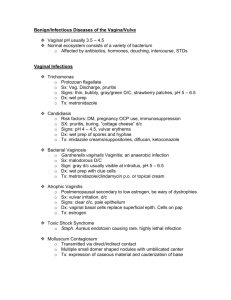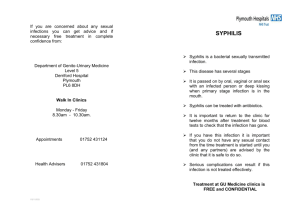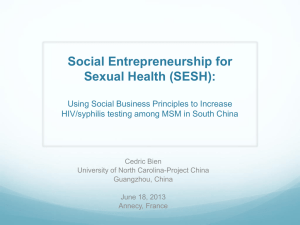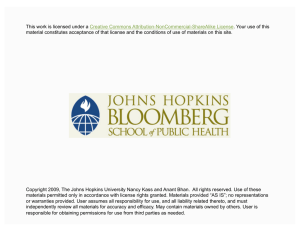Advancing MDGs 4, 5 and 6: impact of congenital syphilis elimination f e
advertisement
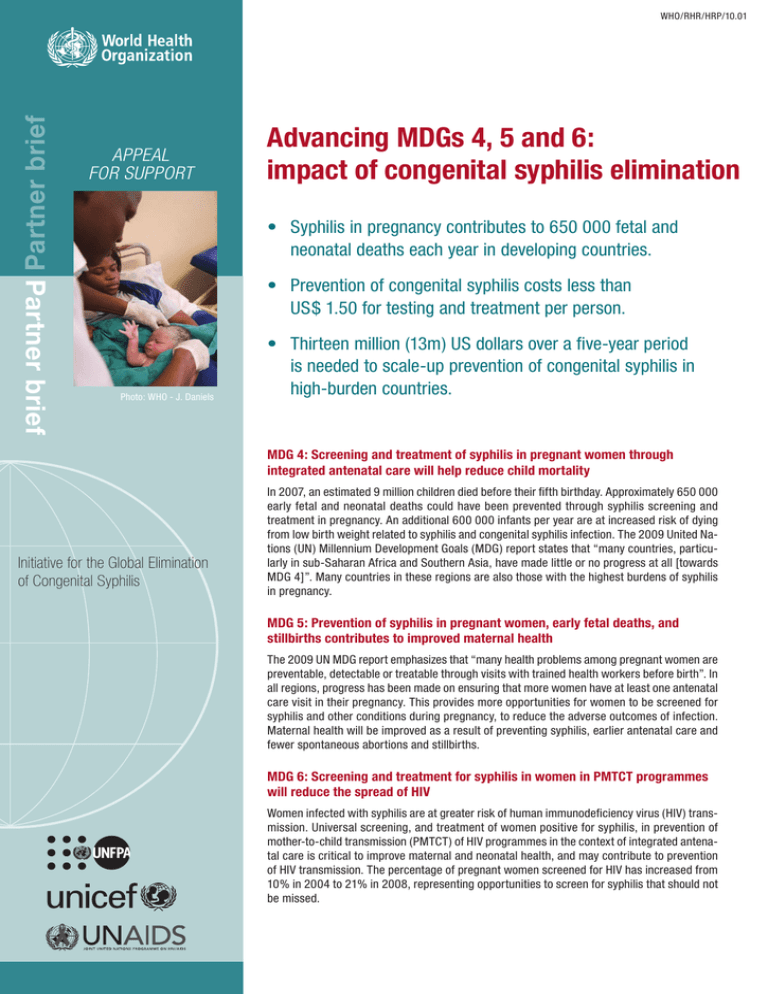
Partner brief WHO/RHR/HRP/10.01 APPEAL FOR SUPPORT Advancing MDGs 4, 5 and 6: impact of congenital syphilis elimination • Syphilis in pregnancy contributes to 650 000 fetal and neonatal deaths each year in developing countries. Partner brief • Prevention of congenital syphilis costs less than US$ 1.50 for testing and treatment per person. Photo: WHO - J. Daniels • Thirteen million (13m) US dollars over a five-year period is needed to scale-up prevention of congenital syphilis in high-burden countries. MDG 4: Screening and treatment of syphilis in pregnant women through integrated antenatal care will help reduce child mortality Initiative for the Global Elimination of Congenital Syphilis In 2007, an estimated 9 million children died before their fifth birthday. Approximately 650 000 early fetal and neonatal deaths could have been prevented through syphilis screening and treatment in pregnancy. An additional 600 000 infants per year are at increased risk of dying from low birth weight related to syphilis and congenital syphilis infection. The 2009 United Nations (UN) Millennium Development Goals (MDG) report states that “many countries, particularly in sub-Saharan Africa and Southern Asia, have made little or no progress at all [towards MDG 4]”. Many countries in these regions are also those with the highest burdens of syphilis in pregnancy. MDG 5: Prevention of syphilis in pregnant women, early fetal deaths, and stillbirths contributes to improved maternal health The 2009 UN MDG report emphasizes that “many health problems among pregnant women are preventable, detectable or treatable through visits with trained health workers before birth”. In all regions, progress has been made on ensuring that more women have at least one antenatal care visit in their pregnancy. This provides more opportunities for women to be screened for syphilis and other conditions during pregnancy, to reduce the adverse outcomes of infection. Maternal health will be improved as a result of preventing syphilis, earlier antenatal care and fewer spontaneous abortions and stillbirths. MDG 6: Screening and treatment for syphilis in women in PMTCT programmes will reduce the spread of HIV Women infected with syphilis are at greater risk of human immunodeficiency virus (HIV) transmission. Universal screening, and treatment of women positive for syphilis, in prevention of mother-to-child transmission (PMTCT) of HIV programmes in the context of integrated antenatal care is critical to improve maternal and neonatal health, and may contribute to prevention of HIV transmission. The percentage of pregnant women screened for HIV has increased from 10% in 2004 to 21% in 2008, representing opportunities to screen for syphilis that should not be missed. Initiative for the Global Elimination of Congenital Syphilis Eliminating congenital syphilis is within our reach Congenital syphilis is a neglected public-health problem Syphilis, caused by Treponema pallidum, is not a new disease. If a woman with syphilis becomes pregnant, the infection may be transmitted to the unborn child, causing congenital syphilis. Congenital syphilis has been around for many centuries. However, we are still witnessing new cases. Despite its high burden, its long and documented history, and the availability of cost-effective diagnosis and treatment, congenital syphilis is not a priority for many countries and remains a neglected public-health problem that continues to cause undue harm and suffering to women and their babies. Photo: WHO - J.Daniels Congenital syphilis is preventable and treatable Existing, simple and cost-effective screening and treatment options could prevent and eventually eliminate congenital syphilis. The World Health Organization (WHO) estimates that 2 million pregnant women each year are infected with syphilis globally. Approximately 1.2 million of these pregnant women with syphilis transmit the infection to their newborn, who may be stillborn, born early, born with a low birth weight, or congenitally infected as a result. Congenital syphilis prevention costs less than US$ 1.50 per person Rapid testing for syphilis can be performed through primary care or antenatal care at a procurement cost of less than US$ 1 per person, and a dose of penicillin, used to prevent congenital syphilis, costs only 50 cents. Despite this minimal incremental prevention cost of less than US$ 1.50 per person, congenital syphilis continues to represent a high burden of disease in Africa and other resource-poor regions of the world. Initiative for the Global Elimination of Congenital Syphilis Just 10 countries account for over 40% of the global burden of pregnancies and newborns affected by syphilis This five-year initiative aims to improve maternal and newborn health by decreasing the number of cases of congenital syphilis by at least 80% in up to 10 high-burden countries by 2015 A network of programme managers, researchers, technical experts and health-system strategists has produced a five-year plan to eliminate congenital syphilis in up to 10 countries. The proposed countries are those with data demonstrating a high burden of disease (Figure 1). These 10 proposed countries account for over 40% of the 1.2 million adverse pregnancy outcomes related to syphilis in pregnant women. Actual implementation of the initiative will also be determined by the level of interest and commitment to implementation of the five-year plan through improved maternal and child health services. All countries under consideration have already made significant investments in establishing effective antenatal care programmes, and their participation in the initiative will help to strengthen these investments over the medium and long term. Implementation partners include ministries of health, nongovernmental organizations, leading research institutions, and in-country technical professionals, who will coordinate with WHO and other UN agencies. In addition, WHO and other UN agency staff and partners will continue to provide technical support to other countries working towards the elimination of congenital syphilis. An integrated, synergistic approach to improving the lives of pregnant women and their children also strengthens antenatal health-care systems The initiative calls for integrating syphilis screening and treatment into a basic antenatal care package, thereby strengthening comprehensive health services for all pregnant women. This five-year plan would: • promote community awareness of the importance of early antenatal care • ensure availability of trained antenatal care providers • improve the quality of antenatal-care provision • increase routine testing in pregnancy for conditions such as syphilis, HIV and anaemia • strengthen systems for distribution of drugs, notification cards and other supplies • encourage the involvement of partners of pregnant women • reinforce surveillance, monitoring and evaluation of key interventions and outcomes. It also calls for syphilis screening to be carried out whenever pregnant women are screened for HIV. Several regions have already taken steps towards the goal of a generation free of syphilis and HIV (see Example 1). Initiative for the Global Elimination of Congenital Syphilis The way forward: partnership and support from the global health community WHO, the United Nations Population Fund (UNFPA), UNICEF, the Joint United Nations Programme on HIV/AIDS (UNAIDS) and a wide range of stakeholders are working together to ensure the success of this initiative. WHO is coordinating this global effort The WHO departments involved in newborn, maternal and reproductive health, and HIV infection are working jointly to coordinate the development and implementation of the initiative, and play a key role in overall vision and management as well as building on their existing strengths for defining the evidence base for interventions. Funds channelled through WHO are used to coordinate and manage the global elimination programme and to strengthen the evidence base for what works to achieve elimination. Contribution of key partners WHO • Coordinate overall vision and implementation of the initiative • Define evidence base for interventions • Provide technical support UNFPA • Support introductory activities, implementation and up-scaling, capacity-building and logistics management • Support countries to integrate adequate programmes in their national budget (costing, budgeting) UNICEF • Support implementation and scale-up • Support logistics and supplies Photo: WHO - C. Gaggero UNAIDS • Support advocacy for HIV-infected women, linkages between HIV programmes, sexually transmitted infection (STI) control programmes and sexual and reproductive health programmes Other partners The Centers for Disease Control and Prevention (USA), Health Alliance International (USA), International Confederation of Midwives, International Federation of Gynecology and Obstetrics, Johns Hopkins Program for International Education in Gynecology and Obstetrics (USA), Program for Appropriate Technology in Health (USA), San Francisco Department of Public Health (USA), University College London (UK), University of California at San Francisco (USA), University of Ghent (Belgium), University of North Carolina (USA), and the United States Agency for International Development (USA). Example 1 PAHO: a regional initiative to eliminate mother-to-child transmission of HIV and syphilis In 2009, countries of the Americas, in collaboration with WHO, the United Nations Children’s Fund (UNICEF) and others, agreed to eliminate MTCT of HIV and congenital syphilis by 2015. Both infections are recognized as significant public-health problems in Latin America and the Caribbean, with an annual incidence of 6400 children infected by HIV and 164 000 children born with congenital syphilis. In order to achieve its goals of elimination, the regional initiative seeks to ensure that at least 95% of pregnant women receive early antenatal care that includes screening for both HIV and syphilis. Initiative for the Global Elimination of Congenital Syphilis Figure 1. Implementation of the Initiative for the Global Elimination of Congenital Syphilis Countries with highest known burden of congenital syphilis Countries with known burden of congenital syphilis Non-focus countries for the Initiative for the Global Elimination of Congenital Syphilis No data available How can you support this five-year initiative? Financial resources are being sought to ensure success It is because of the generous support of donors that this initiative will ultimately come to fruition. The Initiative for the Global Elimination of Congenital Syphilis secretariat is seeking an investment of US$ 13 million for a five-year period to support actions in the highest-burden countries. We hope you will join with the World Health Organization and its partners to eliminate congenital syphilis, which is particularly intractable in resource-poor nations. For information on how to support the Initiative for the Global Elimination of Congenital Syphilis, please contact: Ms Deborah Leydorf, External Relations Officer Department of Reproductive Health and Research World Health Organization Avenue Appia 20, CH-1211 Geneva 27, Switzerland Email: leydorfd@who.int Telephone: +41 22 791 1068 Fax: +41 22 791 4189/4171 www.who.int/reproductivehealth Funds will be used for: • coordinating the initiative: resources are needed at the regional and global levels for coordinating, procurement, managing and monitoring the elimination of congenital syphilis in high-burden countries; • building country capacity to implement the initiative and strengthen health-care systems: support for this initiative at country level will be used to build the capacity of countries to achieve and maintain the goals of elimination as a public-health problem. As the work of the Initiative for the Global Elimination of Congenital Syphilis strengthens primary and antenatal health care, it will leave a lasting and positive impact on health-care systems for women, children and families; • generating new research to ensure that interventions are effective and to track the progress on elimination: much about congenital syphilis is well understood; however, additional research in certain areas, particularly operational research, is needed to strengthen the implementation and the effectiveness of the country plans. Research strengthens the implementation of feasible, highquality, cost-effective and sustainable interventions to eliminate congenital syphilis. We need your support to address this entirely preventable condition.
